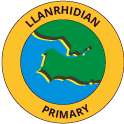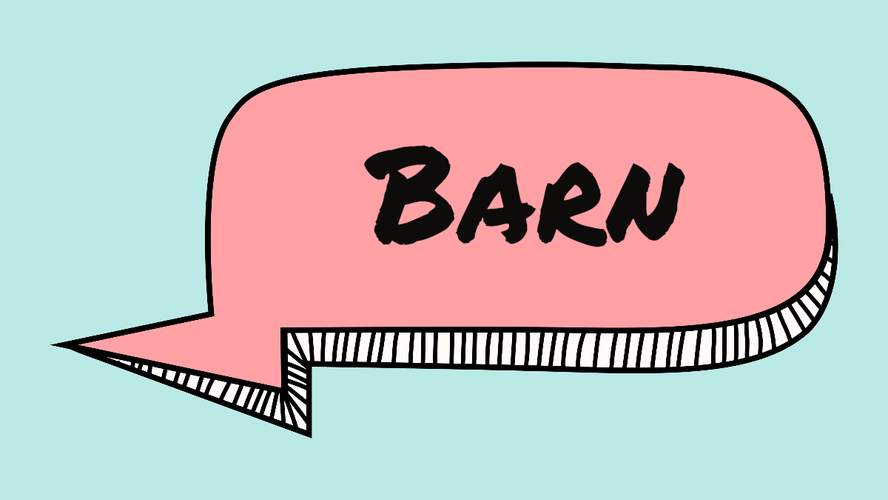Data
Learning as a Result of the Enquiry Process...
To increase the authentic use of the Welsh language in Llanrhidian Primary School, a comprehensive approach involving the community, staff training, pupil training, and planning for purposeful use outside the classroom is essential. Key strategies include:
1. Engaging the Community
- Involvement of Parents: Encouraging parents to participate in Welsh language activities and events fosters a supportive environment.
- Community Events: Organising events such as Caffi Cynefin, where the community can gather and use Welsh in a social setting, strengthens the practical use of the language.
We engaged the community by inviting them to 'have a go' at the Welsh language in Caffi Cynefin and modelled how to do this by putting helpful hints on our menu and also ensuring staff and pupils can be heard speaking Welsh around the Caffi. An example of our menu can be found below.

2. Training Staff
- Professional Development: Providing training and support for teachers to enhance their proficiency in Welsh and their ability to incorporate it effectively in the classroom. Llanrhidian invited our 'Athrawes Bro' to and INSET day to really understand what key phrases staff could integrate into their day to increase the level of Welsh heard around the school.

Resource Development: Creating and distributing resources that aid teachers in embedding the Welsh language in various subjects and activities. Through our #LlanWoW pupils visit different 'Pods' in the school regularly as part of their 'World or Work'. This could be listening to readers of helping at lunchtime. Resources were developed to support pupils in using three key phrases in each role.
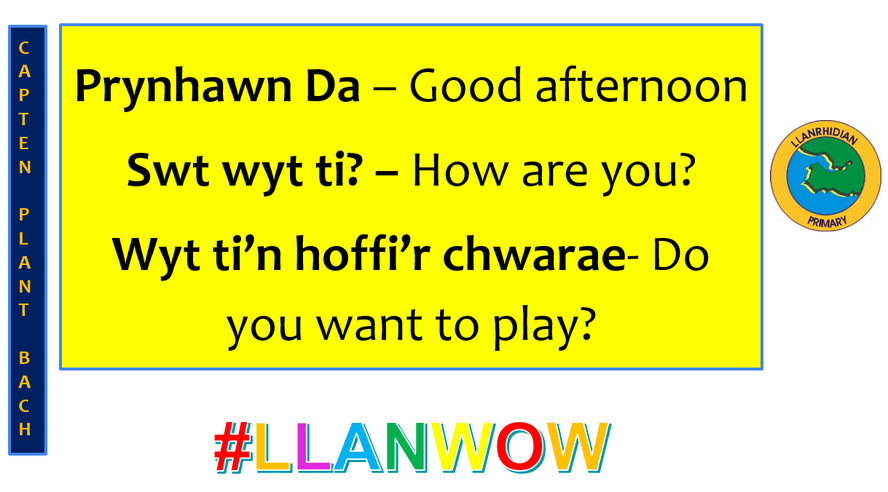

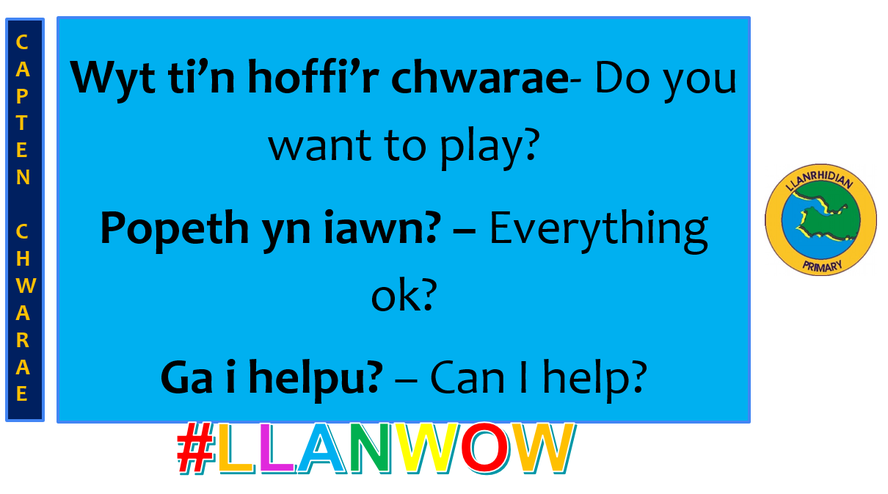

3. Training Pupils
- Welsh Language Workshops: Conducting workshops with our 'Athrawes Bro' and immersive activities that help pupils practice and improve their Welsh language skills in fun and engaging ways.
4. Planning for Purposeful Use Outside the Classroom
- Caffi Cynefin: Setting up a caffi where students, staff, and the community can interact in Welsh, providing a real-world context for language use.
- #LlanWoW: Creating initiatives like #LlanWoW, which could involve challenges, social media campaigns, or events that motivate students to use Welsh in various contexts outside of school.
Summary
The key to increasing the authentic use of the Welsh language in a primary school setting lies in a holistic approach. Engaging the community ensures a supportive environment, while comprehensive training for both staff and pupils equips them with the necessary skills and confidence. Purposeful planning for using Welsh outside the classroom, through initiatives like Caffi Cynefin and #LlanWoW, provides practical and enjoyable opportunities for language practice, thereby enhancing the overall effectiveness of these efforts.
Final Outputs:
Pupil Questionnaire Results:
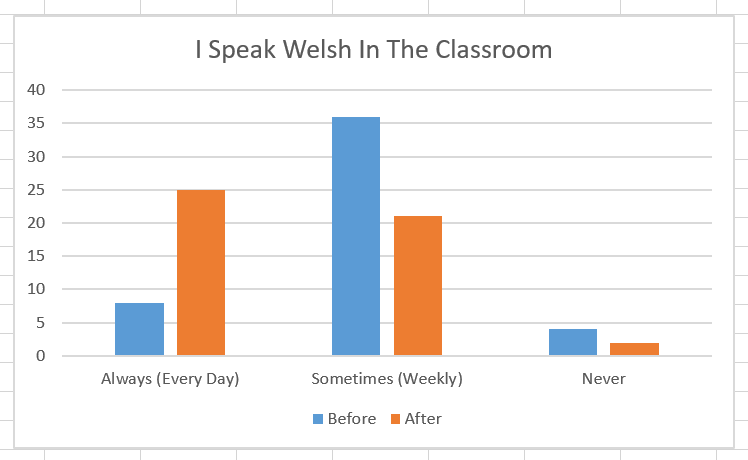
The graph above shows that more pupils say they speak Welsh daily following the enquiry and the number of pupils who never speak Welsh has decreased.
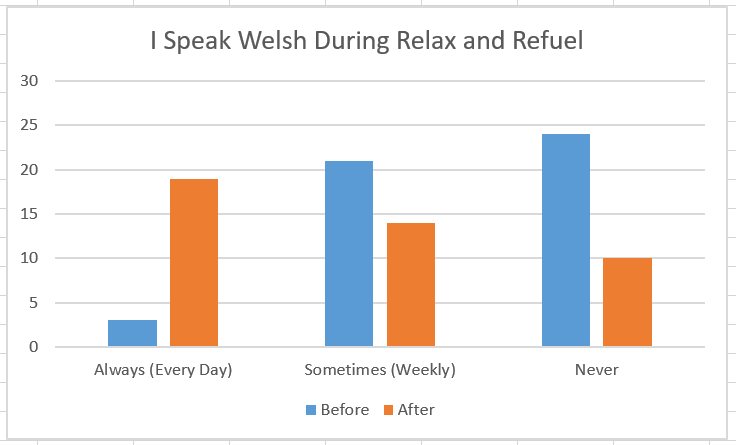
The graph above shows that more pupils say that they speak Welsh during 'Relax and Refuel' after the enquiry. However, this still remains our most challenging time for encouraging pupils to speak Welsh.

The graph above shows that more pupils say that they speak Welsh in Caffi Cynefin now than before the enquiry.
The table below shows the responses from pupils when asked 'What Welsh words/phrases do you use in the Caffi?'
Reported Spoken Phrases by Pupils Before Enquiry | Reported Spoken Phrases by Pupils After Enquiry |
Bore Da Croeso i Caffi Cynefin Ga i Beth wyt i'n hoffi? Beth wyt ti eisiau? .... ydw i Diolch | Bore Da Croeso i Caffi Cynefin Ga i Beth wyt i'n hoffi? Beth wyt ti eisiau? .... ydw i Diolch |
The table shows that there were no additional phrases added after the enquiry, however, observations in the Caffi show an increase in their use by staff, pupils and customers.
Caffi Observations:
Caffi observations were carried out in two ways. The first is shown below, where it was observed how many staff, pupils and customers spoke Welsh during the Caffi.
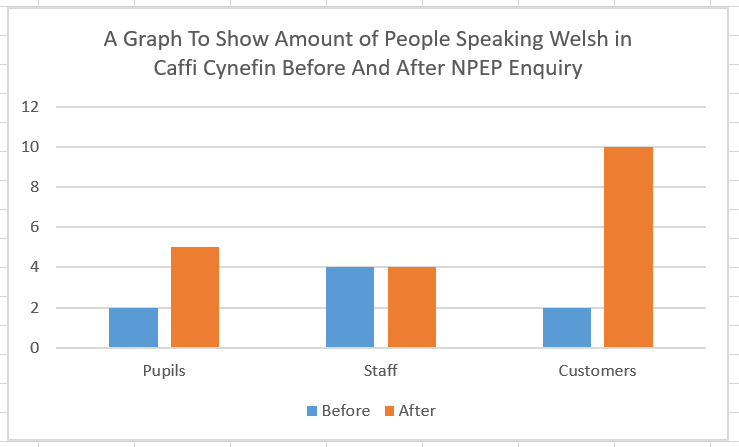
The above graph shows that all the number of pupils and customers speaking Welsh in the Caffi increased after the enquiry. For context, each shift is run by 6 pupils and on average, 24 customers attend the Caffi weekly. 4 members of staff are regularly in the Caffi and could be heard speaking Welsh before and after the enquiry.
The second type of observation, compared how many of each phrase reported by pupils were being spoken and by who.

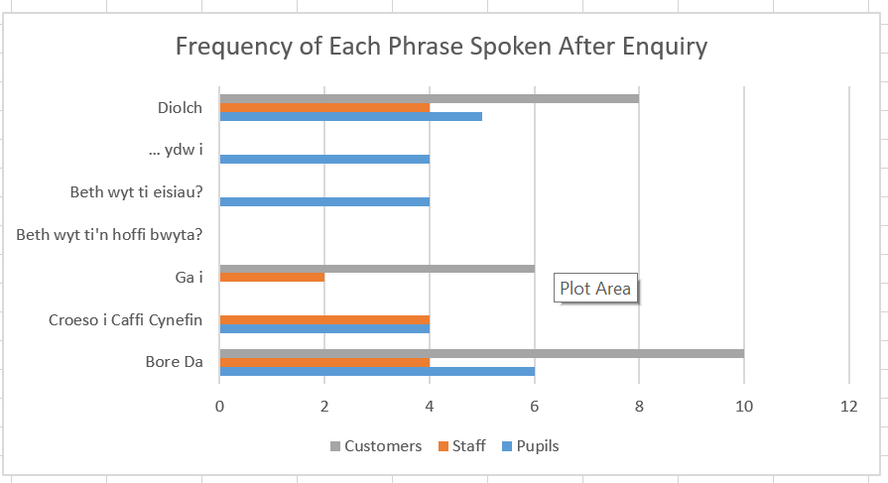
The above graphs show that phrases spoken have been increased by the appropriate group. It was decided by pupils and Pod teacher that 'Beth wyt ti eisiau?' was a more suitable phrase to use than 'Beth wyt ti'n hoffi bwyta?, the data reflects this as there is no change in it's use. However, there are phrases that were introduced by our Athrawes Bro that were no reported by the pupils, these phrases can be focused on as we move forward. For example, pupils using 'dyma' to inform the customer their order has arrived. 'Dyma te!'.
Pupil Evaluation:
Our PEST (Pupil Evaluation School Team) have been monitoring the use of Welsh outside of the classroom all year. Click the image to see their final evaluation!
As you can see, pupils believe that speaking Welsh outside of the classroom has improved particularly through the use of Caffi Cynefin and #LlanWoW. Local schools have visited the Caffi to share best practice and the pupils also recognise how staff training has impacted their learning.










